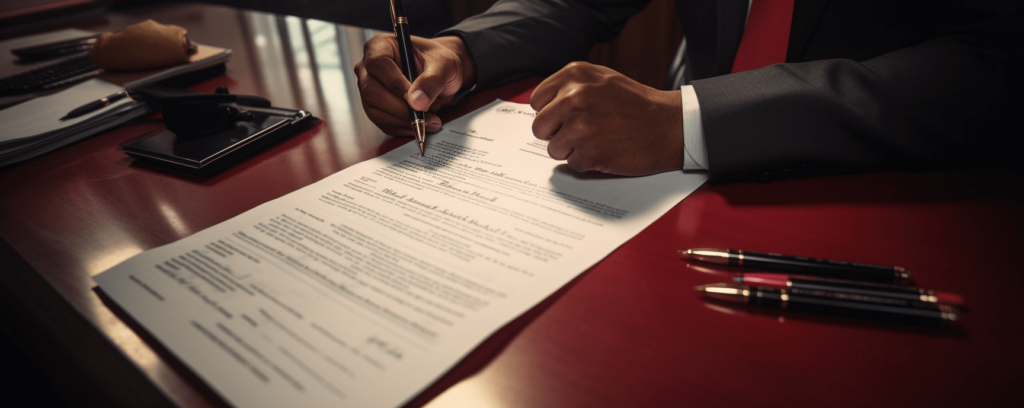So, a car accident has turned your world upside-down, and now you're back home grappling with a stack of documents that seem more complex than a rocket science manual. Medical terms that require a dictionary, insurance clauses that could baffle a lawyer, and questions from family and friends about “what's next” can add to the stress.
This guide cuts through the confusion you'll face after a car accident. Picture it as your trusty handbook for translating car accident gibberish into plain English. From getting a grip on your documentation to understanding your rights and ensuring you're on the right track health-wise, we've got it all covered. Think of this as a how-to guide written by experts fluent in the complex language of car accidents, but translated into terms that anyone can understand.
🔔 FYI: While this guide aims to simplify matters, it's essential to recognize that each car accident is unique. Specific circumstances, challenges, and solutions can vary widely, making professional legal and medical advice indispensable.
Take a deep breath. You're about to embark on a journey toward greater clarity and control in the aftermath of your car accident. The starting line? This guide right here.
🌟 Key Takeaways: Quick Guide to Navigating Post-Accident Chaos
1️⃣ Organize Your Documents: Create a dedicated folder—either physical or digital—for all accident-related records, from medical bills to insurance papers.
2️⃣ Seek Legal Counsel: Don't navigate the complex legal landscape alone. A quick consultation with a lawyer can save you time and potential setbacks.
3️⃣ Health Check-Ups: Immediate medical attention is crucial, but so are follow-up appointments. Keep an eye on lingering or new symptoms.
4️⃣ Understand Your Insurance: Get familiar with your policy. Know what's covered, the deductibles, and any additional features like MedPay that might be useful in your situation.
Refer to these takeaways as you work your way through the aftermath, and circle back for a deep dive into each topic within the article.
Initial Actions: The Power of Preparedness
The First Steps from Home
So, you're home, and you're starting to wonder, “What do I do now?” For most people, this part is like assembling a piece of furniture with a missing instruction manual. But don't fret, the first move is simple: gather your papers.
Organize Documents
Make a folder, physical or digital, and call it something like “The Accident File.” In it, you'll want to store:
- Accident reports
- Medical records
- Insurance policies
Having all your papers in one spot will save you a ton of headaches down the line.
🔥 Hot Tip: Snap photos of all your physical documents. That way, you have a backup that you can access right from your phone.
Consult Legal Advice
Next up, think about talking to a lawyer. The law is a tricky business, and you don't want to navigate it solo. A simple chat can clear up how to talk to insurance agents or even whether you should consider taking any legal steps.
📕 For What It's Worth: A buddy of mine thought he could go it alone and ended up saying things that hurt his insurance claim. Don't let that be you.
Medical Follow-Up
Last but definitely not least, circle back with your healthcare providers. Immediate concerns might have been addressed, but car accidents can have lingering health effects. Make sure you schedule those follow-up appointments and keep tabs on any symptoms.
Understanding the Law: What You Need to Know
Getting Through Legal Steps: What to Watch Out For
The law is a complicated affair, and sometimes it might feel like you're being quizzed on material you've never even studied. It's not a one-size-fits-all scenario; your legal path depends heavily on your unique circumstances. So, before you utter a single word that could be used against you, consider consulting legal advice.
Why? Because lawyers speak “lawsuit” like it's their first language. They can guide you through conversations with insurance adjusters, help you understand the fine print of your insurance policy, and even represent you should your case go to court.
📕 Hear Me Out: A friend of mine skipped the lawyer and ended up inadvertently jeopardizing his claim. Had he spent an hour with a legal pro, he would have saved himself months of headache.
Your Health: The Road to Recovery
Medical Must-Dos: No Skimping Here
Perhaps you've been checked out at the hospital and given the initial all-clear. Great, but you're not out of the woods yet. Car accidents can cause issues that don't reveal themselves right away. It's vital to schedule follow-up appointments with your healthcare provider to catch any delayed symptoms or complications.
Checklist for Medical Appointments:
- Discuss any new symptoms
- Review treatment plans
- Assess recovery progress
🔥 Hot Tip: Keep a health diary. Jot down any changes in your physical or emotional state. This can be invaluable when talking to healthcare providers.
Understanding Insurance: What You Need to Know
Your insurance policy suddenly becomes the star of the show. And deciphering that policy can sometimes feel like trying to read hieroglyphics. Make sure you understand your coverage, deductibles, and what exactly is expected from you during this process.
⭐️ Good to Know: Some insurance policies offer MedPay, which can be a financial lifesaver for covering medical expenses, regardless of who's at fault.
Progress and Adjustments: Staying on Course
Monitoring Your Progress
As you move forward, make sure to keep track of how things are going. Remember that this isn't a sprint; it's more like a walk in the park where you stop and read every signpost.
Review and Adjust
Every so often, revisit your “Accident File” and assess where you are in the process. Are there any unresolved issues? New documents to file? Make sure you're not letting anything slip through the cracks.
🔥 Hot Tip: Set reminders on your phone for follow-up medical appointments, lawyer consults, or insurance check-ins.
📕 Real Talk: Janice had a similar accident last year and kept putting off her medical appointments. She ended up needing physical therapy because of her delay. So, stay proactive!
FAQ
The 11 Burning Questions You Didn't Know You Had: Answered!
Q: Should I talk to the other driver’s insurance company?
A: Speak with your own lawyer first. Anything you say could be used against you later on.
Q: Do I need a lawyer?
A: It's usually a smart move to consult one, especially for complex legal and insurance matters.
Q: Can I file a claim if the accident was my fault?
A: Depending on your insurance policy and state laws, you might still be able to file a claim. Again, consult a lawyer for personalized advice.
Q: What if I didn't see a doctor right away?
A: Better late than never. Schedule an appointment ASAP to get a proper evaluation and documentation of any injuries.
Q: How long do I have to file a claim?
A: Timeframes vary by state and by the type of claim. Check your insurance policy and state laws, but generally, don't delay. The sooner, the better.
Q: What documents should I keep?
A: Hold onto all medical records, bills, police reports, correspondence with insurance, and any proof of lost wages.
Q: How do I deal with medical bills before the claim is settled?
A: Some insurance policies offer MedPay or PIP (Personal Injury Protection), which can cover medical costs upfront. Check your policy details.
Q: Do photos of the accident scene help?
A: Absolutely. They can provide invaluable evidence for insurance claims or potential legal action.
Q: Should I keep a diary of the accident aftermath?
A: Yes, documenting your physical and emotional state can offer useful insights during medical visits and legal consultations.
Q: What if the other driver is uninsured?
A: You may have to rely on your own uninsured motorist coverage. Again, consult your insurance policy and speak to a lawyer.
Q: Can I get a rental car while mine is being repaired?
A: Many insurance policies cover the cost of a rental. Check your policy to see if you're eligible.
You've Got This!
You're Holding Up, and That's Remarkable!
Look at you, making it all the way through this guide. It's not a small feat, considering the whirlwind of questions and worries you're likely juggling right now. While this guide aims to demystify the puzzling aftermath of a car accident, remember that your journey is uniquely yours. With every step, you're gaining a clearer understanding of how to handle this challenging time.
A Word to the Wise: Professional Guidance is Key
As much as we strive for clarity here, no guide can replace the value of professional counsel. Whether it's legal advice or medical consultations, specialized input will tailor the approach you need for your specific situation.
One More Thing: Don't Underestimate Emotional Health
If this article has been a help, consider this a nudge to also focus on your emotional well-being. Accidents don't just leave physical scars; they can take an emotional toll as well. You'll find plenty of resources out there designed to help you cope with stress and emotional challenges after a life-altering event like this.
Hang in there. You're doing more than just surviving; you're adapting and learning, even in the face of adversity. You're proving every day that you can—and will—get through this.

